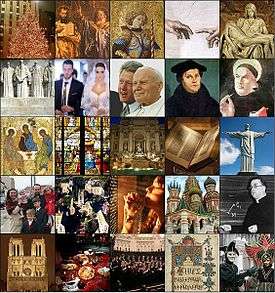Christian music
| Part of a series on |
| Christian culture |
|---|
 |
| Christianity portal |
| Part of a series on |
| Christianity |
|---|
 |
|
|
|
Christian music is music that has been written to express either personal or a communal belief regarding Christian life and faith. Common themes of Christian music include praise, worship, penitence, and lament, and its forms vary widely across the world.
Like other forms of music the creation, performance, significance, and even the definition of Christian music varies according to culture and social context. Christian music is composed and performed for many purposes, ranging from aesthetic pleasure, religious or ceremonial purposes, or with a positive message as an entertainment product for the marketplace.
Worship services

Among the most prevalent uses of Christian music are in church worship or other gatherings. Most Christian music involves singing, whether by the whole congregation (assembly), or by a specialized subgroup—such as a soloist, duet, trio, quartet, madrigal, choir, or worship band—, or both. It is frequently accompanied by instruments, but some denominations (such as some Exclusive Brethren, the Churches of Christ, the Primitive Baptists and the Free Church of Scotland) or congregations still prefer unaccompanied or a cappella singing. One of the earliest forms of worship music in the church was the Gregorian chant. Pope Gregory I, while not the inventor of chant, was acknowledged as the first person to order such music in the church, hinting the name “Gregorian” chant. The chant reform took place around 590–604 CE (reign of Pope Gregory I) (Kamien, pg. 65–67). The Gregorian chant was known for its very monophonic sound. Believing that complexity had a tendency to create cacophony, which ruined the music, Gregory I kept things very simple with the chant.[1]
Instrumental accompaniment
In the West, the majority of Christian denominations use instruments such as an organ, piano, electronic keyboard, guitar, or other accompaniment, and occasionally by a band or orchestra, to accompany the singing. But some churches have historically not used instruments, citing their absence from the New Testament. During the last century or so several of these groups have revised this stance.
The singing of the Eastern Orthodox is also generally unaccompanied, though in the United States organs are sometimes used as a result of Western influence.
Instrumental music
Some worship music may be unsung, simply instrumental. During the Baroque period in Europe, the chorale prelude (for organ) was widely used, generally composed by using a popular hymn tune thematically, and a wide corpus of other solo organ music began to develop across Europe. Some of the most well-known exponents of such organ compositions include Johann Sebastian Bach, Dieterich Buxtehude, George Frideric Handel, François Couperin, César Franck and Charles-Marie Widor to name a few. Up to the present time, various composers have written instrumental (often organ) music as acts of worship, including well known organ repertoire by composers like Olivier Messiaen, Louis Vierne, Maurice Duruflé, and Jean Langlais.
The church sonata (for orchestra and chamber group) and other sacred instrumental musical forms also developed from the Baroque period onwards.
Contemporary Christian music
From the latter half of the 20th century to the present day in Western Christendom—especially in the United States and in other countries with evangelical churches—various genres of music originally often related to pop rock, have been created under the label of Contemporary Christian Music ("CCM") for home-listening and concert use. It can be divided into several genres and subgenres, although the dividing lines and relationships between music genres are often subtle, sometimes open to individual interpretation, and occasionally controversial. These genres (sometimes referred to as "style") like other forms of music may be distinguished by the techniques, the styles, the context and the themes, or geographical origin. Specific subgenres of CCM may include (but are not limited to): Christian country music, Christian pop, Christian rock, Christian metal, Christian hardcore, Christian punk, Christian alternative rock and Christian hip hop. Called Christian pop or gospel in a generalized form, this is a relatively new musical movement and has now evolved into a large number of musical genres by region that comes in a Christian context. This movement appeared as a form of evangelization for the young but the genre is best known and seen in the Evangelical or Protestant proselytizing movements, often using rhythms similar to those in secular music.
CCM is not a musical genre like the other genres. When a song is identified as "Christian" it takes into account the lyrics and the songwriters and performers, rather than musical style. Therefore, one can say that CCM is diverse and there are Christian songs that are sung to the rhythm of salsa, reggae, rock, folk, hip-hop or rap, ballads, pop, country, singer-songwriters and even extreme music such as punk or heavy metal.
Industry
Christian music is supported by a segment of the general music industry which evolved as a parallel structure to the same. Beginning in the 1970s and developing out of the Jesus Movement, the Christian music industry subsequently developed into a near-billion dollar enterprise. By the 1990s the genre had eclipsed classical, jazz, and new age music, and artists began gaining acceptance in the general market.
Media
Today, Christian music is available through most available media. Christian music is broadcast over the radio, television, or the Internet. Christian Albums and video recordings (CD, LP, digital download, DVD, etc.) have been increasingly more popular and have continued to increase in sales.[2]
Christian Musicals is another growing area, especially with the help of the internet. Church drama groups frequently enjoy performing musical dramas which can be downloaded on-line for free use.[3]
Music festivals and conferences
In the US several Christian music festivals have been organized. They are common in the summertime and draw many different people, specifically those from organized groups such as church youth groups and campus groups. In addition to music festivals like those that are part of the Christian Festival Association, there are also many Christian conferences which focus more on speakers, but usually also have musical performances, especially for a Worship service.
The Ichthus Music Festival started in 1970. Today festivals are held annually around the world, and may draw upwards of 100,000 people.
New Zealand's Parachute Music Festival, the largest Christian music festival in the Southern Hemisphere, began in 1989 and is held annually at Mystery Creek Events Centre outside the city of Hamilton.
England's Big Church Day Out Festival began in 2009 and has annual attendance of approximately 20,000.[4]
Concerts
Like any musical group or act, many Christian musical artists perform concerts in concert halls, bars & clubs, or outdoor venues, as well as in Church-related venues. Sometimes it may be for pure entertainment, other times with the intention of witnessing (evangelizing by bearing witness of one's faith), and other times may be part worship as well.
See also
- Byzantine music
- Christian electronic dance music
- Christian hip hop
- Christian metal
- Christian radio
- Christian rock
- Church music
- Contemporary worship music
- Gospel music
- Gregorian chant
- History of music in the biblical period
- Hymn
- Liturgical music
- Mass (music)
- Religious music
- Worship presentation program
References
- ↑ Kamien, Roger. Music: An Appreciation. 9th ed. New York, New York: McGraw-Hill, 2008. Print.
- ↑ Steve Turner (2008-02-27). "Obituary: Larry Norman | Music". London: The Guardian. Retrieved 2011-09-27.
- ↑ "Christian Musicals". Gospel Musicals. Retrieved 29 September 2012.
- ↑ "Big Church Day Out". Big Church Day Out. Retrieved 17 August 2012.
Further reading
- Boyer, Horace Clarence, How Sweet the Sound: The Golden Age of Gospel Elliott and Clark, 1995, ISBN 0-252-06877-7.
- Broughton, Viv, Too Close To Heaven – The Illustrated History Of Gospel Music, Midnight Books, 1996, ISBN 1-900516-00-4
- Albert E Brumley & Sons, The Best of Albert E Brumley, Gospel Songs, 1966, ISBN na-paperback Amazing Grace
- Darden, Robert, People Get Ready: A New History of Black Gospel Music Continuum International Publishing Group, 2005, ISBN 0-8264-1752-3.
- Heilbut, Tony, The Gospel Sound: Good News and Bad Times Limelight Editions, 1997, ISBN 0-87910-034-6.
- Zolten, Jerry, Great God A' Mighty!:The Dixie Hummingbirds – Celebrating The Rise Of Soul Gospel Music, Oxford University Press, 2003, ISBN 0-19-515272-7.
 Herbermann, Charles, ed. (1913). "Ecclesiastical Music". Catholic Encyclopedia. New York: Robert Appleton Company.
Herbermann, Charles, ed. (1913). "Ecclesiastical Music". Catholic Encyclopedia. New York: Robert Appleton Company.- Enciclopedia Cecilia (in Spanish) Includes a Catholic Encyclopedia about music, wiki-style
- Palackal, Joseph, Syriac Chant Traditions in South India
External links
| Wikiquote has quotations related to: Christian music |
| Wikimedia Commons has media related to Christian music. |
